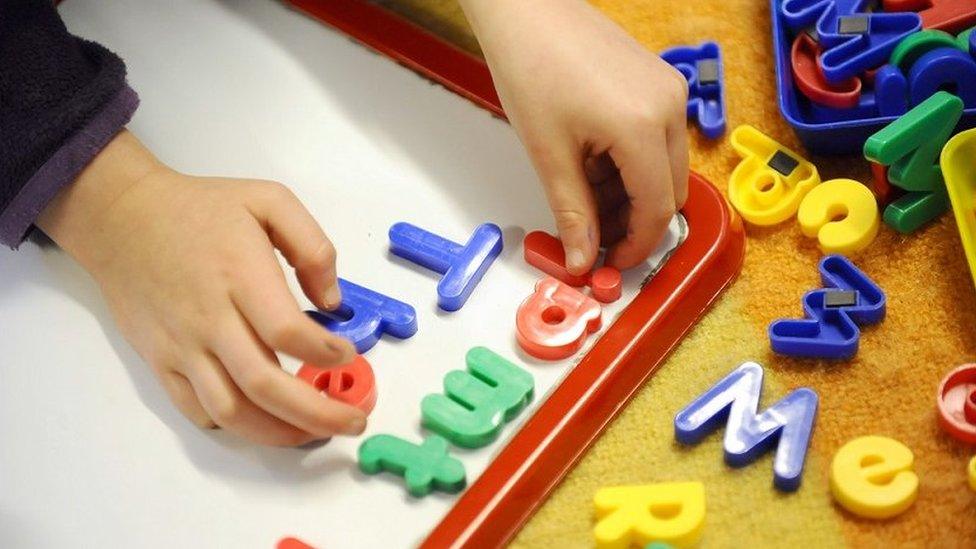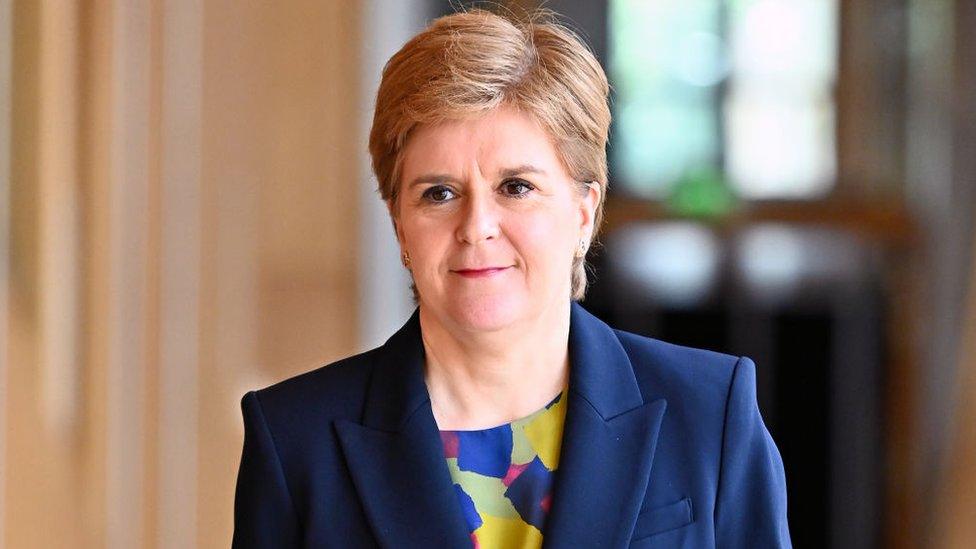Humza Yousaf announces plan to improve childcare
- Published
The First Minister set out a childcare expansion plan in his programme for government.
First Minister Humza Yousaf has confirmed new measures to improve childcare in Scotland.
The SNP leader also said he would spend an extra £1bn on social security and improve pay for social care staff.
The announcements were made as part of the programme for government speech, which comes at the start of each new parliamentary year at Holyrood.
Mr Yousaf said the plan was "unashamedly anti-poverty and pro-growth".
Opposition leaders said it failed to address the major challenges Scotland faces.
The first minister said the government would focus on supporting women, who were "disproportionately affected" by the pressures of modern life.
He announced a pilot for care from nine months to the end of primary school, plans to accelerate care expansion for two-year olds and more scope for parents to personally manage childcare.
The SNP leader said the government would improve childminder recruitment and boost pay to a £12 per hour minimum from April.
Children aged three and four in Scotland currently get 1,140 hours of free care a year.
Echoing a promise made during his time as health secretary, Mr Yousaf said social care workers in direct care roles would see their pay rise to £12 an hour, leading to a pay increase from April of up to £2,000 a year for full-time workers.
However the Coalition of Care and Support Providers said the offer represented a "failure to grasp the reality" of social care in Scotland and called for an immediate pay increase backdated to April.
In other measures designed to combat poverty, the SNP leader told MSPs the government would remove income thresholds for the Best Start food programme by February, meaning a further 20,000 mothers and children would benefit from financial support for milk and healthy food.

Children currently get 1,140 hours of free childcare from three years old, but the first minister has vowed to expand this coverage
Mr Yousaf told MSPs the "driving mission" of his government was to tackle the "scourge" of poverty.
He pledged investment of more than £400m in the Scottish Child Payment to provide more than £1,000 a year for over 300,000 children.
The first minister said this would come as part of £1bn in extra funding for social security measures.
But there was no commitment to increasing the Scottish Child Payment from its current level of £25 a week per child, as campaigners such as the Child Poverty Action Group have been calling for.
Mr Yousaf did, however, call on the UK government to establish an "essentials guarantee", in a bid to ensure that those on Universal Credit always receive enough cash to cover basic needs, such as food, energy and transport.
He said other anti-poverty measures would include the fulfilment of a vow to expand school meals to primary six and seven pupils, starting with those receiving the Scottish Child Payment in 2024.
However, the programme document published by the Scottish government said this would not be rolled out for all P6 and P7 pupils until 2026.
New bills
There were 14 bills in this year's programme for government.
However three of them - Education, Housing and the Scottish Aggregates Tax bills - featured in the plans unveiled by former first minister Nicola Sturgeon a year ago.
The new bills include a Cladding Remediation Bill to introduce a levy in Scotland - replicating the UK government's Building Safety Levy, an Agriculture Bill to create a new framework for rural support and a Land Reform Bill to make land ownership more transparent.
The government will also consult on curbing the sale of disposable vapes, including consulting on an outright ban.

The Scottish government will consider plans to ban single-use vapes
Mr Yousaf also backed bills to criminalise misogynistic abuse and create safe access zones for abortion clinics.
He touched on his own experience of baby loss as he pledged to improve the treatment of women and their families after a miscarriage.
And the first minister committed to the creation of a certificate and memorial book of pregnancy and baby loss - a policy backed by Ms Sturgeon in her final weeks as first minister.
The first minister cited his grandfather, Muhammad Yousaf, who was a small business owner and claimed there was "no way" he could have done so without "the support of society".
As part of his pro-business pledges, he announced a £15m plan to support innovation and entrepreneurship.
Mr Yousaf told MSPs he would seek a deal with the onshore wind industry to halve the consenting time for new section 36 wind farms.
The government will invest £750m to help provide affordable homes and spend £60m this year on buying empty properties for use as affordable homes, the first minister said.


Almost as important as the big speech on programme for government day is the paperwork which goes along with it.
Humza Yousaf has followed the format he used in his "fresh start" launch, by having each of his cabinet secretaries take responsibility for their own portfolio, in their own name.
This "big tent" collaborative approach to government perhaps belies the fact there is no obvious Yousaf Doctrine among the proposals - the new first minister is mostly moving along with plans which have already been mooted or consulted on.
There are devils amid the detail too.
Mr Yousaf's speech highlighted his pledge to roll out free school meals to pupils in primary six and primary seven.
But the document underlines that the goal is to do this in 2026 - two years later than the last target, which itself had been delayed from 2022.

Scottish Conservative leader Douglas Ross described Mr Yousaf's plan as "tinkering around the edges" of public service challenges.
"Consultations and trials rather than promises and delivery," he said. "Extreme green policies that will devastate our economy and rural communities and of course, very predictably, an overwhelming focus on the SNP's obsession with independence."
Labour chief Anas Sarwar welcomed some of the proposals, including those to improve pay for social care staff, to take action on affordable housing and measures to combat misogyny.
However, he said the programme for government failed to address the "twin crises" of the cost of living and issues with the NHS.
And Scottish Liberal Democrat leader Alex Cole-Hamilton warned the policy agenda would not be sufficient to address issues with Scotland's public services, which he said were at "breaking point".
- Published5 September 2023

- Published6 September 2022
